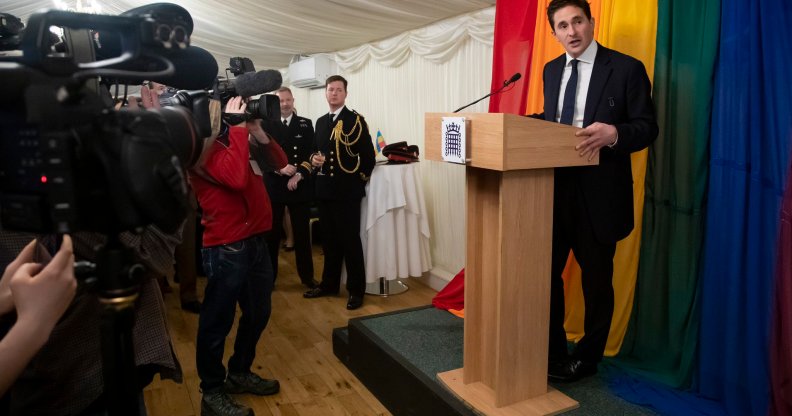Defence minister Johnny Mercer apologises again – this time for Catholic priests who outed gay soldiers

Johnny Mercer delivering an official apology to the LGBT+ soldiers sacked over their sexuality (Twitter)
Minister for Defence, People and Veterans, Johnny Mercer, has apologised after it emerged that gay soldiers in the British Army were outed by Catholic priests.
Some veterans told The Times that they went to Catholic priests for confession while serving in the army and were questioned about their sexuality just days later.
Mercer has apologised for the practice just days after he apologised on behalf of the government for the historic treatment of LGB soldiers.
“Our policy regarding LGB members in the military was unacceptable then, and as a defence minister, I personally apologise for those experiences,” he said.
“Pastoral encounters between service chaplains and personnel should be strictly confidential,” he added.
Ban on lesbian, gay and bisexual soldiers was lifted in 2000.
The breach of soldiers’ trust and privacy took place when gay, lesbian and bisexual people were banned from serving in the UK’s armed forces. The ban was finally lifted in 2000.
In the Catholic Church, the Seal of Confession means that priests have a duty to never disclose anything they are told in the confession box.
Church of England chaplains were also believed to have been involved in the practice of outing LGB soldiers to superiors.
Pastoral encounters between service chaplains and personnel should be strictly confidential.
The revelation comes just days after Mercer issued an apology at the Houses of Parliament for the historic ban on LGB soldiers. His apology came on the 20th anniversary of the lifting of the ban.
“As the minister for defence, people and veterans, I wanted to personally apologise to you today for those experiences,” he said, Sky News reports.
Johnny Mercer apologised for treatment of LGB soldiers in a speech last week.
“If I am honest, it is hard to conceive – as a more contemporary veteran of our armed forces – the environment too many of you experienced when you were serving.
“Where being a member of the LGBT+ community would have got you detained, followed by a dishonourable discharge from the military.
“Volunteering to serve is an act of bravery in itself; to volunteer for the chaotic, challenging nature of service life and yet within that community, which so many of us are proud of, experience discrimination of this sort is unacceptable.”
The ban was lifted by a Labour government in January 2000 after a number of LGBT+ people took a legal case against the ban with the help of charity Stonewall.

